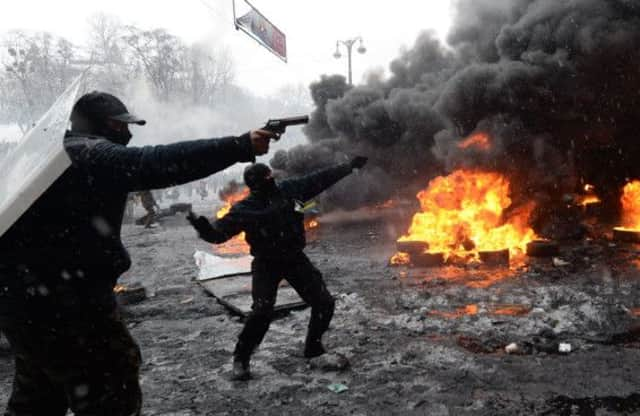Russia denies pulling strings as Kiev heats up


The role of Ukraine’s former imperial master in the political crisis that has gripped the former Soviet republic since November has become a source of debate, conjecture and dark rumour among Ukrainians.
To some radicals manning the barricades in Kiev, Moscow is seen as the puppeteer pulling the strings of its political, financial and cultural might to dictate terms to Ukraine’s leaders. But Moscow dismisses stories of interference, saying it wants to leave Ukraine to itself.
Advertisement
Hide AdAdvertisement
Hide Ad“We do not feel it is justified in any way for us to intervene in the internal affairs of fraternal Ukraine,” Dmitry Peskov, spokesman for Russian president Vladimir Putin, said last week. “This is unacceptable, and Russia has not done it and will not do it. Any decisions taken in Kiev are taken by a sovereign state that has accepted the leadership of the country through a democratic processes. Intervention by any means is unacceptable to us.”
Moscow has also gone on the offensive, accusing the West of dabbling in the affairs of its neighbour and stirring up an already volatile situation. Taking a swipe at European leaders who have rallied to support the anti-government demonstrators in Ukraine, Sergey Lavrov, Russia’s foreign minister, made Moscow’s views on interference in the crisis clear.
“We would prefer some of our European colleagues not to behave so unceremoniously in connection with Ukraine’s crisis, when members of a number of Europe’s governments without any invitations dashed to take part in anti-government demonstrations in a country with which they have diplomatic relations,” he told journalists in Moscow.
“It is simply improper and it is heating up the situation.”
Some are sceptical of Russia’s claims to have kept its hands clean of the Ukrainian crisis. Ukraine, they argue, is too important to the Kremlin to be left to its own devices.
Zbigniew Brzezinski, the former national security adviser to United States President Jimmy Carter, once wrote that “without Ukraine, Russia ceases to be an empire, but with Ukraine suborned and then subordinated, Russia automatically becomes an empire.”
The logic behind the statement dictates that Moscow has to intervene in Ukrainian affairs, one way or another. The Kremlin almost certainly placed pressure on Kiev to walk away in November from an association agreement with the European Union, which would have brought the vast country of more than 45 million people out of Russia’s orbit and very much closer to the EU fold.
Kiev’s decision to ditch the agreement with the EU triggered the vast wave of unrest that has rocked the country for almost two months, but Moscow has stressed it had nothing to do with the political manoeuvring.
“The decision that the Ukrainian president took to postpone the signing of the association agreement was his decision, not Moscow’s, not Putin’s,” insisted Vladimir Chizhov, Russia’s ambassador to the EU.
Advertisement
Hide AdAdvertisement
Hide AdThe unrest in Kiev was further fuelled when Ukraine signed a £10 billion aid package with Moscow to help keep Ukraine’s creaking economy from sliding into crisis. The money, while giving Kiev a certain amount of financial breathing space, was seen by some as Moscow’s bribe to keep Ukraine on board, and seems to undermine any claim Moscow may have of non-interference.
There is also talk of more covert measures the Kremlin may have taken to keep matters in Ukraine moving in its direction.
“We know there are many advisers from Russia here to counsel the government,” Aleksey Leshchenko, vice-president of the Gorshenin Institute, a respected Kiev-based research body, told Scotland on Sunday. “We know there are representatives of the FSB – the Russian secret service – here who are counselling our prime minister, counselling members of our secret service. We understand Russia has some interests here and is trying to influence them.”
Just what these interests are is unclear, but Leshchenko believes there is an understanding between presidents Viktor Yanukovich and Vladimir Putin. “There is an arrangement between Yanukovich and Putin at a personal level, so Putin has an interest in keeping Yanukovich in power,” explained Leshchenko.
“We don’t know the details of these arrangements because they are kept secret but it appears Yanukovich has to stay loyal to Putin.”
Although keeping Yanukovich in power appears in Moscow’s interests, the Kremlin has avoided – at least publicly – taking sides in the conflict, appearing to have learnt the lessons of Ukraine’s Orange Revolution of 2004.
Then it chucked its lot behind Yanukovich, only to suffer the embarrassment of seeing “their man” kicked out in an election forced by the revolutionary zeal of the Ukrainian masses.
Yet for all the speculation over the role of Moscow, to many in Ukraine and abroad the Kremlin already appears to be a winner.
Advertisement
Hide AdAdvertisement
Hide AdThe crisis has driven Yanukovich and his government away from the West and the EU, and into a much closer relationship with Russia.
The longer the crisis continues and the more vulnerable Ukraine’s leaders become, the more they will have to look for support to their friends in the East.